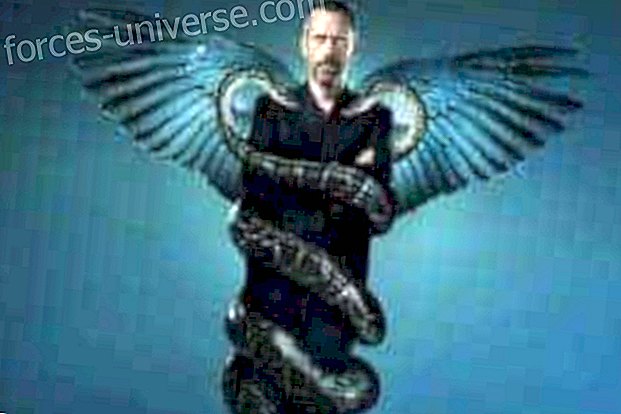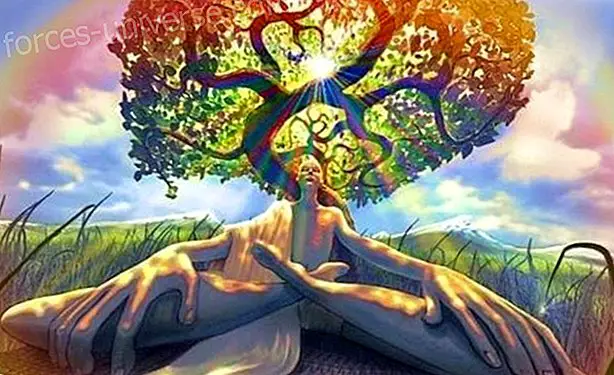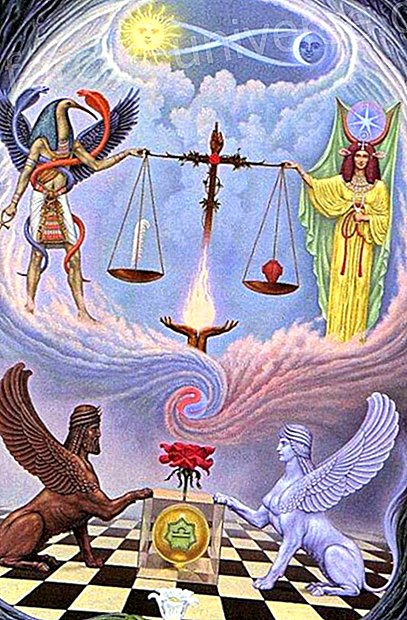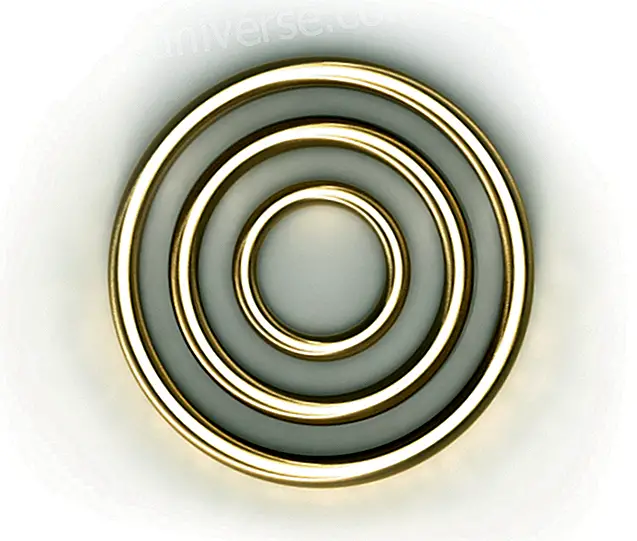
That evangelical maxim that said that "You cannot serve two Lords at the same time", added to that of "My kingdom is not of this world", lead us to the real fact that Christianity is not a religion or a method, but it is a state of consciousness that is not disseminated through preaching but through conscious experiences and realizations. If Christ is the Victor of death, the first Risen One and who assured that " Whoever believes and lives in Me will not die ", it was because, defeating death, that is, introducing Life into death, made Consciousness possible. The first thing that Christ did, after his death on the cross, was to break down the barriers of Hades, to free the imprisoned souls, to enable their correct re-integration into the natural post-mortem process, so that such souls stopped wander through a bland and grayish limbo, in an ocean of unconsciousness and darkness, to be able to reintegrate into a process that opens and enables the light of consciousness to all Humanity. It is therefore from Golgotha that a new process of personal and social self-consciousness dawns in the history of Humanity, which is developed and intensified later by a process of increasing individuation, from the nineteenth century, within what has been called Age of the Conscious Soul in the evolutionary development of the human soul.
The objective of Evolution is none other than to generate the convenient states of consciousness, and therefore each Epoch, each stage, each moment, requires a state of consciousness appropriate to it to face it. Therefore, what happens to us today is that, in order to become aware of those adverse forces that unconsciously in this world of matter control our lower body system, we must begin by becoming sensitive to the perception of Evil, since in Ultimately, the suprasensitive entities, the Higher Hierarchies, are only consciousness. For our current stage, what is expected of humanity is a specific kind of consciousness, and what it would be about is to cultivate a form of consciousness that is capable of recording the dual nature of our reality. This is more difficult than it seems, because many millennia ago that the human mind has been conditioned to filter and interpret reality as if it were unitary, and, we already know that an organ, a faculty, which ceases to exercise, ends up disappearing. . When the individual becomes aware of the permanent action of Evil and that material reality is a "dream", an "illusion", this reality loses, to some extent, at the beginning small but progressively increasing, its capacity for enchantment and imprisonment about the person, gradually weakening the egoic identification that clings to matter and to the forces that dominate and sustain it.
According to widespread opinion in modern science, religions are the result of the invention of man to face his fear of the unknown and to fill the void of his ignorance. And yet this contradicts any rigorous investigation of reality: the primitive human being was incapable of inventing anything, or perceiving an existential void, but he was able to receive teachings, not through the intellect, of suprasensitive entities that he perceived and that they supervised and led him. Therefore, religion was the code of behavior and communication of primitive man with such non-material entities. And so it has been for millennia.
When, as Steiner tells us, the human being loses his faculties of suprasensible perception, already almost extinguished at the end of the mood known as the Sensitive Soul (around 747 BC), in the decline of the Egyptian / Persian / Chaldean times / Babylonian / Jewish, the Greco-Latin cultural era of development of the Rational Soul or feeling begins and will last approximately until 1413 with the Renaissance. Such translation implies the transition from a type of affective-participatory awareness to a thinking-separative one.
At the stage of the Sensitive Soul the human being was directly connected with the reality that surrounded him through feeling and a perception not mediated by thought. Fully integrated into reality, he was part of it and felt with it, his role in the world was not questioned.
When the faculties of this type of mood configuration decline, those of the Rational Soul arise. There is a dissociation with the environment and a feeling of isolation that makes man consider his destiny and the deep sense of things, of suffering in life and about the truth. At that time we have the emergence of thought as an instrument to begin to know the reality and the role that man has in the world. It is the beginning of the exercise of judgment and criticism, which are manifested in the first Greek authors and in the birth of philosophy, at the same time as a rational thought, although full of emotion.
The Development of the Conscious Soul
Since the 6th century AD, the germ of a new faculty in the human being was prepared as a spiritual impulse in the human evolutionary process, in that part of our psyche exercised on the sensory perception of the faith world Physical, which gives us a waking or alert awareness of physical-material reality. Such a perception is necessary to awaken the individuality, underlying the concept of selfishness or false individuality, beginning or germ of what in the future will be the authentic individuality in what fraternal, as an expression of absolute detachment and critical surrender. This impulse will ferment from the fifteenth century, which is what is known as the anemic stage of the development of the Conscious Soul we are currently in, and which will last approximately until 3573.
Thanks to this new faculty in the person's psyche, he has the option of finding himself in front of his own individual identity that is distinctive of the rest of the beings, allowing him his independent self-determination. of the political-religious institutions and social entities that until then have directed it, or of the attachment to the hereditary-blood ties or of races, peoples and nationalities. In the period of the Conscious Soul, man can awaken to his absolute individuality, compared to the rest of reality understood as something alien.
Philosophical movements and various theories of knowledge will emerge, such as romanticism, idealism, positivism, rationalism and existentialism, etc, in that search for the ideal behavior to achieve positively transform reality. The external world / brain (neurosensory system) connection has never been as clear and clear as it was at this time, and that makes it possible to wake up from individuality, from consciousness, despite the difficulty, still, to place ourselves within reality, of what is and of what we are within it.
In this new emotional stage of awakening of consciousness a kind of recapitulation is made, as a spiritual impulse of the previous stages, which can be characterized in the cultural in the fifteenth and sixteenth centuries from Italy of the sensitive soul ( in the Renaissance ) and since the XVII in France of the rational soul (with the French Revolution ).
Subsequently, it is in the German-Anglo-Saxon culture (composed of Britons and Germans) that the era of the Conscious Soul will be fully characterized with the industrial revolution . From the eighteenth century, in the nineteenth century and especially in the twentieth century, after the Second World War, these peoples that represent it, and in their extension to the American continent, are the ones who will exercise the real leadership throughout the planet .
We know that the spiritual impulses that have to characterize a cultural age are inescapably produced, although they are generally perverted in their application. As an example of this we have what happened with the French Revolution, in which the Rosicrucian Christian impulses of freedom, equality and fraternity, instead of the modeling effect of social systems, what they envisioned in their application was to favor social leaders and bourgeois classes possessing economic goods.
But if we honestly ask ourselves, what characterizes the time of the Soul of Consciousness today? What has perverted the right spiritual impulses of fraternity in the economic, of equality in the political-legal and of freedom in thinking ? What moves the wills of more than 6000 million human beings that inhabit the planet? We will have to answer with total security and synthetically: money. Whether you like it or not , like it or not , money is the basic social engine of our societies, in the hands of oligopolies and multinational companies, linked to global financial systems, to the sacrosanct economic principle of freedom of the economy (the so-called market economy ) throughout a world governed by the philosophy and praxis of economic liberalism or neo-liberalism, assumed internationally by all world power and order, through the total movement of capital, unlimited profits, etc.
Freedom in Thought and Fraternity in the Economic
All this is nothing but a misrepresentation of the freedom of thought that had to occur in the nineteenth century: the free-thinkers. The starting point would be based on the fact that human beings, people, do not have to be subjected, in their thinking capacity, to any doctrine or belief, to deologies, to a race, to a sex or to a state, but simply and simply to his own self. In the time of the Conscious Soul, cultural and educational processes must enable the autonomous functioning of thought in the necessary individualization processes.
On the contrary, what should be conditioned and regulated by laws is the economy, which cannot be moved in absolute freedom, but based on the concept of fraternity. The economy in freedom means that everyone who can exercise the stimuli and put in place the mechanisms to optimize a production based on personal benefit, without laws that limit or impede it. What would happen to the economy if there was no money, if only what each one needed exists: housing, food, clothing, etc. How were we going to provide that ? . We would realize that the important thing is not the money, that it disappears, but of running out of what we have (clothes, house, car, school, etc.). It is essential to differentiate between the current structures mounted on the basis of money, when working for a salary, or being aware that if I produce something it is not for me, but for others, who in turn I need to live, from something as simple as a sweater to some shoes, as this will allow me to verify that thousands of people are working to allow me to develop my existence, and that my work is also for others, not for myself. If I pilot an airplane, for example, it is not because of the salary, but because I help to move 200 people who need it.
The process has been perverted through the economic cycle in recent centuries and that is why we now all believe that we work exclusively for ourselves. Professional development is absolutely selfish and we understand that this is normal and convenient. Such a philosophy of life, already rooted in the depths of our unconscious, through an entire educational and cultural system, prevents the human being from becoming aware that what is important is what each of us contributes to others and what many people give us. They contribute with their work throughout our lives.
Children of the 20th Century
All cultural processes are based on knowledge theories, or philosophical foundations that direct them. In this sense we are all “ children of the twentieth century ”, immersed in a culture that has been preparing for some centuries, and that is why we think, as we do, in norms and beliefs that since childhood have been taught to us and that We consider and believe true. However, it is precisely in our time of development of individual consciousness when it would be time to question all that learned and realize the great amount of things that we "know" but are not true. Unless we are socially illiterate and marginalized, we are all educated based on a Western civilization that has spread throughout the world, from Asia to Africa and Australia. It is an influence that comes from the United States of America based on a gynecology that originally comes from Europe, specifically from France and Germany, but fundamentally directed from England economically, which was then fermented in the USA and subsequently expanded to the rest of the world.
For thousands of years mankind had been experiencing that thoughts are living beings that manifest themselves in the human mind from the spiritual world, that collects those thoughts and orders them and understands them by adapting them to the material physical world. In the fifteenth century, as we have seen, began the development of consciousness, so that certain people began to experience that their thinking was born in their own brain: " I think, it occurs to me, I have ideas developed by me ." In this way, every possibility of perceiving thought as a gift, like rain coming from the spiritual world, vanished and that process culminates in the nineteenth and twentieth centuries with the expansion of culture and literacy of large masses of people, everything which generated a cultural wave that vanishes any spiritual knowledge (not belief).
The concept of intellectual property arises, governed by money, copyright, as mental creations that have an author. It is a parallel process to isolation, to the feeling of not belonging to a group, to personal importance. I am the one who imports, above family, race, country, etc., each one is each, with all its misery and greatness. As we go back in time the group importance was greater, the individual was important depending on the group to which he belonged. In the time of the conscious soul we consider ourselves individual . It is an evolutionary process through which the human being has to go, facing the problem of selfishness that governs individualization, which coincides with an increase in the forces of thought in relation to personal feelings. I am alone and there is the world : the subject and the object. To this is added a whole process of change in the role of the sexes, which occurs in the mid-twentieth century in which women, the feminine aspect of human beings, will also take the momentum of individualization in a way that stops to be kidnapped by masculinity to act firmly and resolutely in the social, political and economic framework.
Individuality and Individualism
The problem of individuality is that it can lead to creating individuals, something that is needed, but also to an increase in exacerbated individualism, of selfishness . Individuality is necessary as a process, an inevitably selfish individuality in principle, through which we all have to go, and in which we have the opportunity and the right to decide to guide our will to think and act in the way we consider m It is adequate. This implies a huge cultural change in which religious doctrines and beliefs are losing strength.
Individualism makes me isolate myself from the group and see others intuitively, instinctively, as something dangerous, to face. The more I am yo the more I lose my empathy with others and less depend on the group, with which I cannot communicate. This leads to competitiveness in a world of winners and losers, who are because they deserve it. However, the individual is the person who has been able to become independent, in some way, from the social conditions imposed. Develop a personality according to what you morally believe is true and good. It can contribute to the social the best it has since society needs many individuals who have overcome the forces of selfishness.
The self has to relate to the other self, not depending on whether the other pleases me or not constitutionally. The essence is inside, headed by the individualistic selfishness. I have to see the individual who is behind the mere appearance that the other presents to me, which hinders human relationships.
At the same time, man needs to see himself, even if he does whatever it takes to not see his own self, and therefore uses drugs, evasions, etc. that stun and stunt your astral (emotional) body, numbing your conscience, because consciousness will lead you to see how your spirit lives, and, if it lacks self-discipline and will, it will lead you therefore to frustration and, consequently, to the flight of self-knowledge.
The current materialistic culture has the advantage of being able to homogenize, by means of the single thought that paves all the differences, billions of human beings robotiz ndo them to fulfill slogans, with all the power of the media. In this sense, the current problem of the human being is not due to a lack of spiritual capacities, but fundamentally due to cultural conditions that have been castrating us conveniently when we believe ourselves: you are nobody, you do not own anything, you have nothing transcendent, when you die, everything ends or you condemn yourself or save yourself for all eternity if you do not fulfill the mandates, etc. With this it has been possible to annihilate the security of the human being in himself, his own self-esteem, at the same time that everything that has to do with tradition and customs weakens, the churches lose power to forced marches, just like That family trends.
This annihilating process of all the previous cultural influence that has taken place in the twentieth century and that continues to advance, causes the individual to rebel because there is no longer anything that directs his will, thus generating the emptiness in souls, the denial of God, insecurity. To replace or compensate for the lack of the divine, and for emotional weakness, faith in the church and its dogmas that are not understood has been replaced by a certain faith in the scientific postulates (the authority of the science ) that are not understood either, even if they occur as true in a kind of innate faith of coal. Fundamentally we are beings of faith, we need to believe in something, even in institutions that are above us, to which we grant the strength and representation of the truth that we do not know: this will give us some security, despite that science only covers the physical-material field, without any response of the transcendent. In the end, the person, if he thinks, also loses that security and remains in what is lived today as an indeterminacy in which man returns to experience the sensation: "I only know that I know nothing ." We have a lot of information that essentially is not worth it since it does not serve to answer the vital questions: Where do I come from, who am I, where do I go ?
The Force of Thought and Moral Consciousness
Humanity has given itself with childish confidence to faith that was not understood, for many centuries, to divine providence through its "representatives" on earth, whether in Catholicism or in other established religions. It was necessary that a job could be done from the individual, with faith that was not understood based on the strength of the feeling, giving confidence to what could not be united with the strength of consciousness. But more than 2000 years of evolution have passed and today we can consciously ask ourselves the questions with the force of our thinking.
If you ask yourself, what is a human being ? Among other things we can consider it as " a center of evolving moral consciousness, " that is, we have a conscience and a moral one, which evolve. We know that in nature everything is shaped so that it works in a balanced way, without excess or defect, without anyone endangering the continuity of life ... except the human being, which can be dangerous for the planet. We understand as moral what facilitates that continuity, and immoral, what harms it. Man, for millions of years, has always had a moral, without conscience, from every cell, subsumed in the organism of which an entire army of spiritual beings is part, acting with the exclusive mission of shaping the body, selflessly. Other consciences act for us.
Now we are all necessarily selfish to be able to individualize ourselves, and therefore we are partly immoral. Our consciousness begins to be detached from the spiritual impulses that the Divine Hierarchies have not always come. Thought begins to manifest itself in humanity since that beginning of philosophy, through the love of wisdom, for 2700 years in Greece, cradle of Western civilization. That thought, although it was still experienced as a gift from the divine world of ideas, allowed to come into contact with reality, and will evolve until, unlinked from the divine, it is considered a right of people, of thinking authors. Automatic moral direction is lost, instinctive moral behavior, and awareness is gained through our thinking, through a freedom for its use in whatever we want without the need to be mediated by doctrines and norms.
Today we all have a capacity for thought, with unlimited possibilities that we do not know; We are at the beginning of its use, after five centuries we use it almost exclusively for our interests, to discover some physical laws that govern in the material plane. This selfish use of thinking was necessary and lawful because the human being needed to stop thinking "religiously" (not spiritually) by replacing it with scientific thinking and thus gain control of subjectivity and the conquest of objectivity. This had to generate a correct attitude of not using that selfish thinking exclusively for my convenience and pleasure to adapt the laws of the physical world that I can discover. That quality of objectivity of scientific thought was necessary so that individual moral consciousness could develop. To do this, we have to stop thinking in a utilitarian way to put the conscience of each one at the level of reality, a process that although very long it is possible to carry out, from the 20th century, on the objectivity gained thanks to the detachment in scientific research .
Objectivity in the thought that has reached many millions of human beings and makes possible the beginning of that moral conscience directed by that thought free of prejudices and cultural conditioning and doctrines. Beginning of a process that we can all do if we propose it and begin to get rid of those cultural conditions that we have: it requires a personal work of self-knowledge, a path of personal research on reality, from a change from natural science to science spiritual, not denying the natural, but including it within the scope of all the spirit-spiritual reality in which the physical-material lives, expanding our consciousness, so limited today because our culture teaches us (and we believe it) that our consciousness has that stick to the teaching we receive (conditioning, not determinations that cannot be modified).
This gives us the key to the reason for the current situation of the chaos that man suffers today, of indetermination and hopelessness. Everyone has to reflect and realize (becoming aware of reality) see what they can do. The important thing is the attitude we take, acting morally as best we can, depending on what each one considers to be the most appropriate. This will depend on the wisdom of each one, which has to be transformed into love . The way he sees life each man will condition the morals he possesses. Which will entail a demanding attitude of good will and total honesty. That the personal processes are conscious, as authentic as possible, not artificial or induced by anything or by anyone, but by myself, by my will, so that, without anguish, and exercising that Conscious Soul that we are developing all Humanity in this current transcendental evolutionary period, I can transform them myself.
Biosophia Drafting Team
SEEN AT: http://www.revistabiosofia.com/index.php?option=com_content&task=view&id=299&Itemid=55






